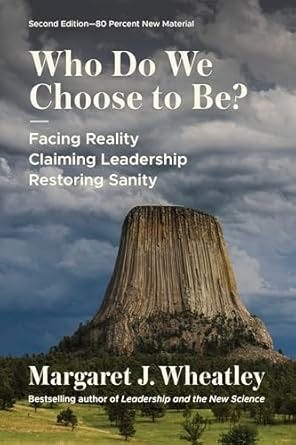I don’t think that a book has affected me as much as Margaret Wheatley’s Who Do We Choose To Be? Facing Reality | Claiming Leadership | Restoring Sanity.
I’ve been recommending it to people over the last several months but never with so much urgency as yesterday, one day post the 2024 U.S. Presidential election.
I am desperate to be in community with people about questions like:
“In a world we cannot recognize, how do we find a way forward?
In this world we do not understand, how do we know what to do?
When so little is comprehensible, what is meaningful work, what is genuine contribution?”
Wheatley, Margaret J.. Who Do We Choose to Be?, Second Edition: Facing Reality, Claiming Leadership, Restoring Sanity (p. 4). Berrett-Koehler Publishers. Kindle Edition.
Most difficult for me to grapple with is decoupling my values and actions from the addiction of hope. Letting go of an improved future confronts me with the realization that most of my work has been fueled by the belief that effort + intention = progress.
Meg Wheatley says, “sorry, but no” and chillingly declares:
It is too late for meaningful change.
If the conditions and circumstances we want to transform - and I’m talking the biggies:
Climate crises
Racism
Misogyny
Economic Inequality
Political Systems
War / Terrorism / Gun Violence
will never change meaningfully due to the systems-within-systems holding them in place, then what is the spark that will keep us engaged, doing the work, and trying to make the world a better place?
Declaring human’s capacity to create change oblivious to other causes and conditions is unconscious Anthropocentrism, the unexamined arrogance that we are Masters of the Universe.
Freeing Ourselves from the Addiction of Hope
How do we move beyond the hubris of the human will and into identifying and becoming rooted in what is actually within our sphere of influence?
I am not a master of the universe. If I was, my candidate would have won on November 6th. I wouldn’t be terrified about my child’s future. I could opt out of a growth-at-all-costs economy that I rely on to make a living but is destroying the Earth and its many inhabitants.
It’s a bitter pill to swallow that a change is [not] gonna come. And I’m certainly not going to force anyone to swallow it.
But I am interested in the new questions and possibilities that this orientation invites us to consider:
What does the world need from me?
What is meaningful work?
What contributions will make a difference?
I’m convening a group to discuss the ideas in Who Do We Choose to Be in January.
If you are interested please:
Buy or borrow the book now and start reading. It’s easy to read and understand, but the concepts are deep and you will need to take your time and reflect.
Drop a comment here, LinkedIn, or robin@ubuntuculturecompany.com indicating your interest
Once I get a group I will send out a poll to determine a time that can work for most, followed by an inaugural invite to engage in dialogue.
I look forward to being in community and exploring ideas with you.





Thank you, Robin! It's so important to keep the energy moving, to not fall into a torpor of despair. This is an excellent nudge to stay engaged, to keep the work going, to shore each other up as we face these excellent and essential questions together.